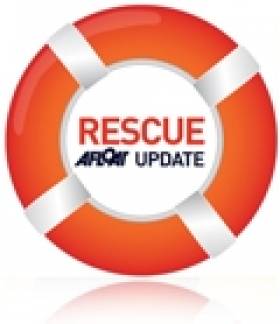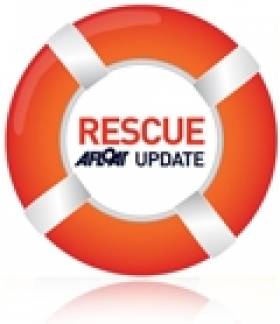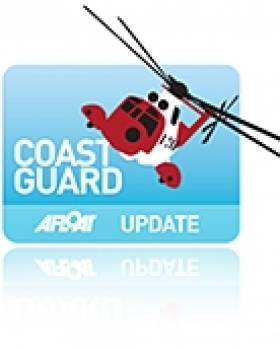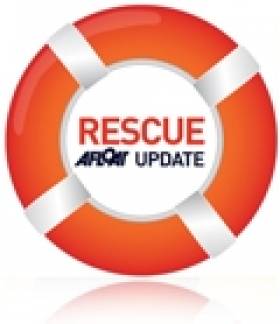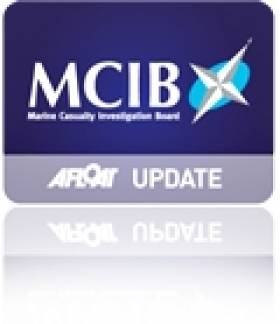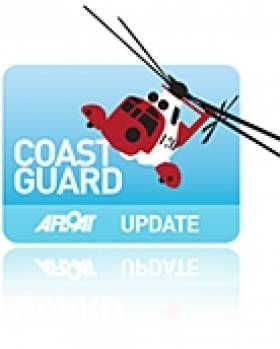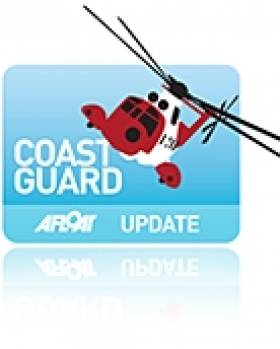Displaying items by tag: Search and Rescue
Eyewitness To Lough Ree Tragedy Tells Of 'Freak Accident'
#LoughRee - The News Letter in Belfast has a report from an eyewitness to the tragedy on Lough Ree yesterday (20 March) that claimed one life today, with another man critically ill and one still missing.
Tommy Byrne told how his dogs "got a bit spooked" by the sudden squall on the lough that capsized the boat the three Co Armagh anglers were travelling in.
“It just appeared to me that the squall got them, hit their boat and sank them," he said. "It was just a random freak accident."
Byrne, who joined in with the search and rescue operation, said conditions on the lough yesterday afternoon "were nasty enough, but it wasn't particularly wild."
The News Letter has more on the story HERE.
#LoughRee - RTÉ News is reporting this morning (Friday 21 March) that one of two men recovered from Lough Ree last night has died in hospital.
The second man is still in critical condition while the search resumed this morning for a third man missing after the boat carrying the party of three capsized in strong winds near Hodson Bay outside Athlone, as reported yesterday on Afloat.ie.
It's since emerged that the three men were part of a group of six from a Co Armagh angling club.
Local anglers have joined the Lough Ree RNLI lifeboat, the Garda Water Unit and and the Athlone and Lanesborough Sub Aqua Club in the search and rescue operation, which is concentrating on a debris trail stretching some 3km along the eastern side of the lough.
Search For Missing Man As Two Recovered From Lough Ree
#Search - RTÉ News reports on an ongoing search and rescue operation on Lough Ree this evening (20 March) as two men have been recovered from the water as RNLI lifeboat and Air Corps teams look for a third.
It's believed that the party of three are from Northern Ireland and may have got into difficulty in their boat close to Hodson Bay, near Athlone. One of the two rescued is said to be seriously ill, and both are being treated in hospital.
More on this story as it develops.
Cork Boat Builder Puts Its Vessels To The Test In Atlantic Storm
#Search&Rescue - Surfers haven't been the only ones benefitting from the recent stormy weather, as RTÉ News reports on a Cork-based boat builder that's been testing its top models in the wild Atlantic swell.
Youghal-based search-and-rescue (SAR) and pilot boat builder Safehaven Marine took its SAR vessels based at Roche's Point in Cork Harbour to the limit during sea trials earlier this week. Click HERE to see video of the sea trials in action
It follows similar trials of the company's pilot boat Interceptor 48 late last month as conditions turned for the worse off the Cork coast.
In waves reaching heights of 20 metres and winds breaking the 100km/h mark, the boats were tested in the extreme this week, but it was more than necessary for the hard work they'll be put through in service.
RTÉ News has more on the story HERE.
Search Resumes For Sea Angler Missing Off Clare
#Missing - The search was set to resume this morning for a man who fell into the sea off Co Clare yesterday afternoon (15 December).
As The Irish Times reports, the missing man, a Latvian national, is one of two anglers who has been fishing from rocks near Blackhead, on the south side of Galway Bay.
It's believed the second man left the scene to get help when his colleague went into the water, and could no longer find him on his return.
It's also thought the Latvian national could have been in the water for several hours before emergency services were alerted.
Doolin coastguard, Aran Islands RNLI and the Shannon-based coastguard helicopter were all dispatched for the search and rescue operation, which was called off at 6pm in poor light.
End Of An Era As Irish Coast Guard's Last S61 Retires
#Coastguard - It was the end of an era yesterday (10 December) as the last remaining Sikorsky S61 search and rescue (SAR) helicopter in the Irish Coast Guard fleet stood its final SAR watch since services began in 1991 and was retired from active service.
According to the IRCG, the last stand by 'Alpha Romeo' was possibly the last ever watch by the world's oldest SAR S61, going on an impressive 52 years since its manufacture.
From today the chopper will be replaced by one of the new Sikorsky S92 aircraft, which as previously reported on Afloat.ie are currently being trialled as an air ambulance service, set to expand from Galway to Dublin in the coming weeks.
Woman Rescued From Cliff Fall On Causeway Coast
#Rescue - Two coastguard units, the Portrush lifeboat and a Royal Navy helicopter from Scotland were involved in the rescue of a woman who had fallen 50 feet off a cliff on the Causeway Coast at the weekend.
As the Belfast Telegraph reports, the woman, believed to be in her 20s, had been walking along the top of the cliff between Ballycastle and Ballintoy in Co Antrim in the early hours of Saturday morning when she apparently slipped and fell.
Search and rescue teams jumped into action when a car was spotted near Carrick-a-rede rope bridge some hours later, and the woman as located at the base of a nearby cliff below Portaneevy Viewpoint just after 9am.
The woman has sustained multiple injuries and was suffering the effects of shock and hypothermia, but was successfully airlifted to Causeway Hospital in Coleraine where her condition was described yesterday as stable.
The Belfast Telegraph has more on the story HERE.
Fisherman Drowned 100 Metres From Shallows Says MCIB Report
#MCIB - Various factors - including poor buoyancy, suboptimal lifejackets and a fateful late decision to swim to shore - have been identified in the official report into the death of a fisherman off the Waterford coast earlier this year.
As previously reported on Afloat.ie, a major search and rescue operation was launched on 10 January when a 16-foot fishing punt capsized in a strong swell at the sandbar off Brownstown Head near Dunmore East, throwing its two-man crew overboard.
James Tate was able to swim to the nearby shore in the early morning darkness after some two hours in the water. But he became separated from his friend Johnny Flynn - a former member of the Dunmore East lifeboat crew - who was found unconscious in the water by coastguard helicopter before 8.30am.
Flynn was pronounced dead at Waterford Airport shortly after, with a post-mortem concluding that he cause of death was drowning.
The tragedy occurred six years to the day after the sinking of Dunmore East trawler the Pere Charles, which took five lives.
In the official report into the incident, the Marine Casualty Investigation Board (MCIB) found that the fishing punt, already vulnerable to breaking waves as an un-decked open boat, was more susceptible due to its waterlogged condition, and the lack of adequate buoyancy.
It was also found that neither the vessel's handheld VHF radio nor GPS device, or indeed Tate's mobile phone, were available to the pair after the boat turned turtle.
Though both men were wearing lifejackets, they were of a kind that lacked a collar that would have kept the deceased's head above water, nor did they have a light or whistle. Only Tate was equipped with any kind of light, so he could not locate his friend in the dark.
Most importantly, it was found that the boat had overturned within 100 metres of the shallows, so that if the pair had attempted to swim to shore earlier - rather than tire themselves out trying to climb onto the upturned hull - the chances of both men surviving the incident "would have been greatly enhanced".
The full report into the incident is available to download below.
Sunny Days See Coastguard's Busiest Period in Two Decades
#Coastguard - Last weekend 8-9 June was the Irish Coast Guard's busiest since 1991 for search and rescue indigents, as reported yesterday on Afloat.ie.
Today's Irish Examiner goes deeper into the figures, which show more than 53 coastguard search and rescue incidents took place around the country last Saturday and Sunday - ranging from missing persons to swimmers in difficulty, vessels broken down, missing children, personal watercraft and speedboats operating in a hazardous way and urgent medical evacuations.
In addition, the Irish Coast Guard's rescue helicopter fleet – not including any of the other IRCG units – was tasked a massive 18 times over the weekend alone.
The fleet was this week bolstered by the arrival of two Sikorsky S-92s previously flown by the British Coastguard.
Set to operate from Shannon, the choppers join the state-of-the-art Rescue 115 which has been operational since last year, and was last week on course to conduct the Irish Coast Guard's longest range mission ever.
Irish Coast Guard Launches TV Water Safety Campaign
#Coastguard - The Irish Coast Guard (IRCG) has launched its new 'Stay Safe on the Water' TV advertising campaign aimed at families, leisure users and the fishing industry during the busy summer months.
This is the coastguard’s first TV advertisement, having its premiere on RTÉ One television this evening after 6pm.
The IRCG was motivated to launch its first TV water safety campaign following the success of the Road Safety Authority (RSA) TV campaigns. The new 20-second adverts will run from now until the end of August.
Coastguard statistics have recorded 11 deaths by drowning in Irish waters so far this year, and last weekend was the Irish Coast Guard's busiest since 1991 for search and rescue incidents.
Speaking at the launch, IRCG manager Declan Geogheghan said: “This summer we began our 2013 safety awareness campaign in May and we want to strongly get across the safety message to families, leisure users and the fishing industry about going out on the water.
"We want everyone to enjoy the outdoors this summer weather but remember to heed our advice to ensure that you and your family and friends stay safe.”
Last Saturday and Sunday saw more than 53 coastguard search and rescue incidents taking place around the country. Of these, 21 were co-ordinated by the Dublin Marine Rescue Co-ordination Centre (MRCC), 18 by Valentia MRCC and 14 by Malin MRCC.
These incidents ranged from missing persons, swimmers in difficulty, vessels broken down, missing children, personal watercraft and speedboats operating in a hazardous way and urgent medical evacuations.
Coastguard helicopters alone – not including any of the other IRCG Units – were tasked a massive 18 times over the weekend.
“The pleasant, warm weather brings thousands of people to our coastlines, to our beaches and the outdoors," said Geoghegan. "We want everyone to enjoy the outdoors but to remember to take simple, basic advice about staying safe on the water and along cliff paths, when hill walking and enjoying the outdoors.
"Time and again, we see people ignoring basic safety advice, taking risks and then getting into difficulty, sometimes leading to loss of life. The coastguard is a 24/7 service but we must again advise caution as too many people are taking risks and ignoring our advice.
For specific advice and information on any water and coastal activity, visit www.safetyonthewater.ie.
Throughout the summer, as at other times of the year, Irish Coast Guard units throughout Ireland will patrol our waterways and coastlines issuing safety advice and information to holidaymakers, tourists and marine users.
The following are general safety tips and advice from the IRCG to help enjoy the water and coastal activities in your area this weekend and throughout the summer:
Swimming
Only swim at beaches and waterways that have lifeguards on duty and pay attention to the safety flags. Ask the lifeguard for advice about safety and water conditions and adhere to their instructions. Avoid using inflatable toys, such as li-los and rubber rings, on the water.
Cliff Walking
There is safety in numbers, so never be alone if possible. Let somebody know when and where you are going and what time you will be back. Stay well away from the cliff edge, both top and bottom. Don’t attempt to rescue people or pets if they fall over the edge. If assistance is required dial 999 or 112 and ask for the coastguard.
Water Sports and Coastal Activities
Before going to sea check local weather conditions and tides in the area. Wear correctly maintained and fitting lifejackets that are suitable for the activity. Lifejackets are of no use unless they are worn. Ensure your craft is fit for purpose. Always advise someone as to where you are going and the time of your intended return. Do not overload the craft. If you are in difficulty or see someone in difficulty and requiring assistance dial 999 or 112 and ask for the coastguard.
Finally, under no circumstances should anyone ever engage in water activities under the influence of alcohol.




























